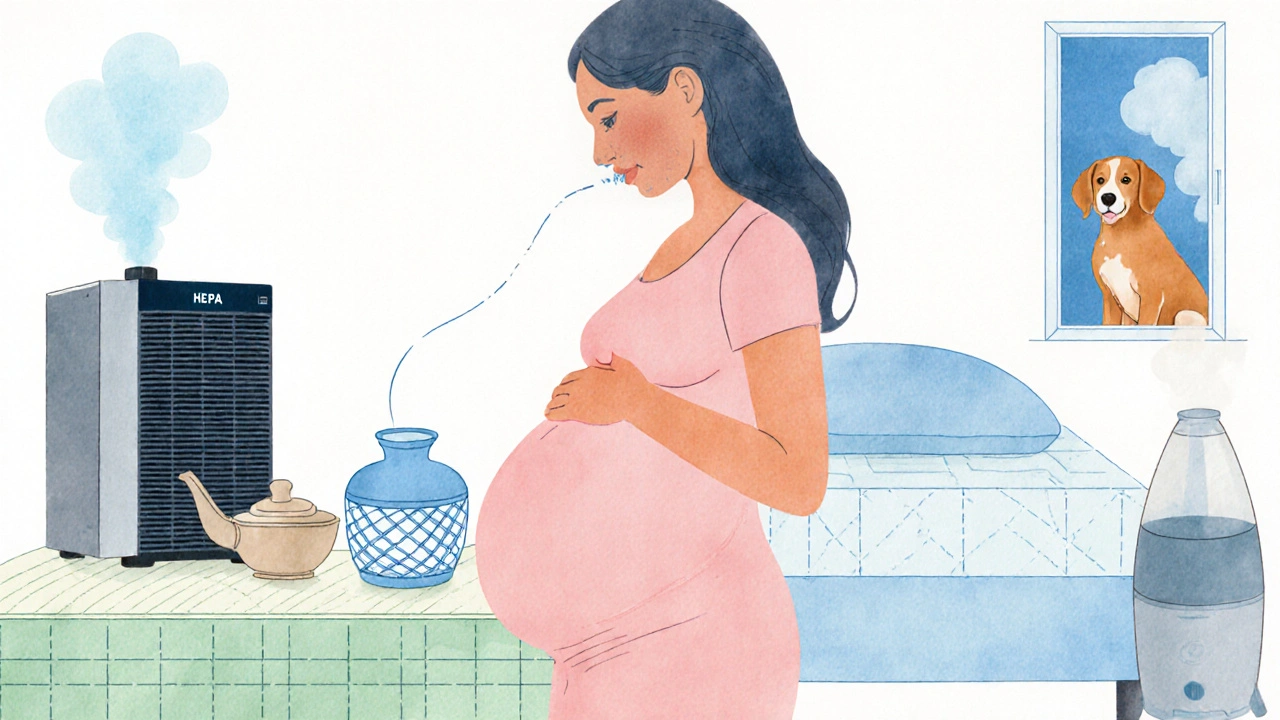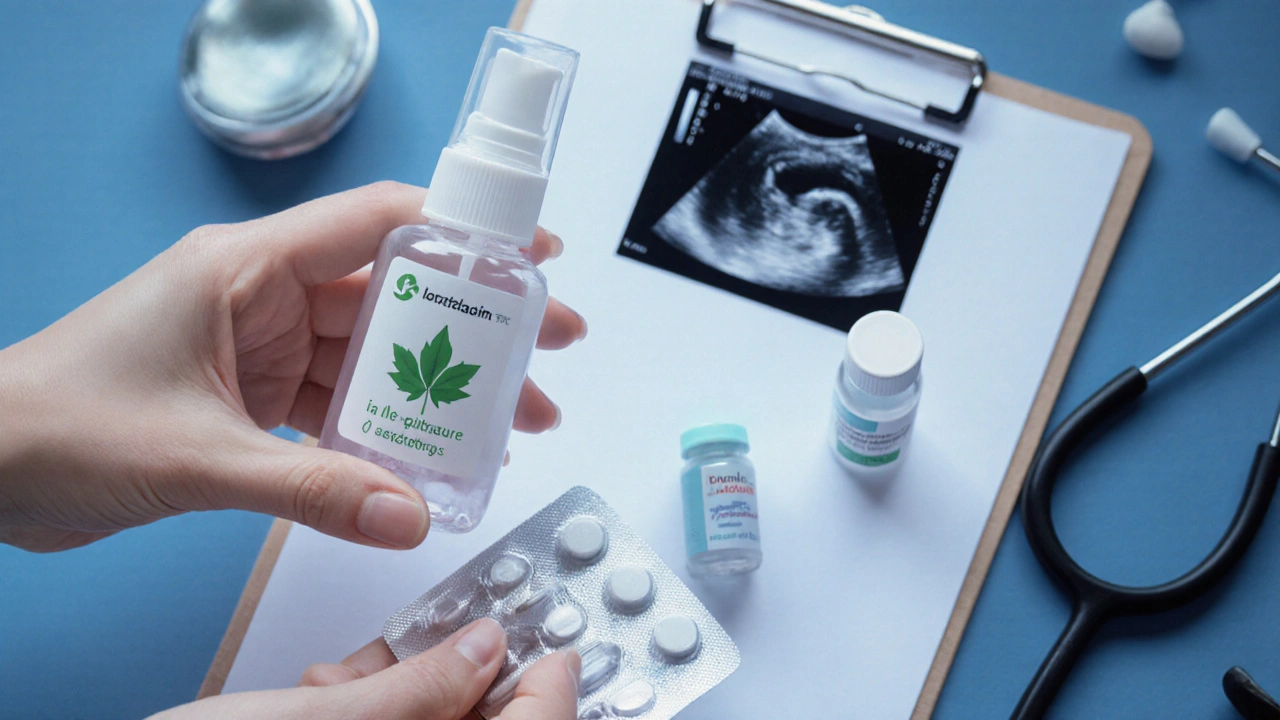Pregnancy Allergy Medication Safety Checker
Safety Information
Dealing with pregnancy allergies can feel like a juggling act-your nose is stuffed, your eyes itch, and you’re constantly worried about what’s safe for the baby. The good news? You don’t have to choose between comfort and caution. Below you’ll find a step‑by‑step guide that blends science with real‑world tricks, so you can breathe easy all year long.
When dealing with Allergy Management during Pregnancy is the practice of controlling allergic symptoms while ensuring fetal safety, it helps to break the problem into three parts: understanding what’s triggering you, choosing safe relief options, and knowing when professional help is needed.
Key Takeaways
- Identify and limit exposure to your personal allergens.
- Start with non‑drug measures-air filters, saline rinses, and nasal strips.
- Only use medications proven safe: certain antihistamines, nasal steroids, and prescribed immunotherapy.
- Never self‑medicate with decongestants or herbal supplements without doctor approval.
- Keep a symptom diary to track what works and discuss it with your obstetrician.
Understanding Allergies in Pregnancy
Pregnancy subtly shifts your immune system, often intensifying existing sensitivities. Hormonal changes increase blood flow to the nasal passages, making mucus membranes swell-this is why a mild hay‑fever can feel much worse during the third trimester.
Allergens are substances like pollen, dust mites, pet dander, or mold that trigger an immune response. Knowing which ones bother you the most is the first step toward control.
Non‑Drug Strategies: First Line of Defense
Before reaching for a pill, try these low‑risk tactics. They’re cheap, safe, and often surprisingly effective.
- Air Quality Control: Use a HEPA filter in the bedroom and keep windows closed on high‑pollen days. Change HVAC filters every three months.
- Daily Nasal Saline Rinse: A neti pot with sterile saline clears out pollen and dust without medication. Aim for 1‑2 rinses per day during peak seasons.
- Reduce Mattress Dust: Encase pillows and mattresses in allergen‑proof covers. Wash bedding weekly in hot water (≥130°F).
- Limit Pet Dander: Keep cats and dogs out of the bedroom, and bathe them weekly.
- Skin Moisturizers: For itchy eyes or skin, fragrance‑free moisturizers create a barrier that reduces irritation.

Medication Options: What’s Safe for Mom and Baby?
When non‑drug measures aren’t enough, you’ll need medication. Not all allergy drugs are created equal, and pregnancy adds a layer of safety screening.
Antihistamines are drugs that block histamine receptors to reduce itching, sneezing, and runny nose. The two most studied antihistamines considered low‑risk are Loratadine (Claritin) and Cetirizine (Zyrtec). Both are classified as Category B by the FDA, meaning animal studies show no risk and there are no well‑controlled human studies showing harm.
Nasal Steroid Sprays such as Fluticasone (Flonase) and Budesonide (Rhinocort) reduce inflammation directly in the nasal passages. Using them at the recommended dose is generally regarded as safe throughout pregnancy.
| Medication | Pregnancy Category | Typical Use | Safety Notes |
|---|---|---|---|
| Loratadine (Claritin) | Category B | Oral antihistamine | Safe for daily use; avoid higher than recommended dose. |
| Cetirizine (Zyrtec) | Category B | Oral antihistamine | Safe; can cause mild drowsiness. |
| Fluticasone nasal spray | Category C (limited data) | Topical nasal steroid | Low systemic absorption; safe in recommended doses. |
| Diphenhydramine (Benadryl) | Category B | Oral antihistamine | Can cause sedation; not first‑line for daytime use. |
| Phenylephrine (decongestant) | Category C | Oral decongestant | May reduce placental blood flow; avoid unless doctor advises. |
| Herbal remedies (e.g., butterbur, echinacea) | Not classified | Alternative treatments | Insufficient safety data; avoid without medical guidance. |
Immunotherapy: Long‑Term Relief for Year‑Round Allergies
For those who suffer from chronic allergic rhinitis, allergen‑specific immunotherapy (allergy shots or sublingual tablets) can modify the immune response over months to years. The key question is whether it’s safe during pregnancy.
Current guidelines from the American College of Obstetricians and Gynecologists suggest that if a woman is already on a stable immunotherapy schedule before conception, she may continue safely under close supervision. Starting a new course, however, is generally postponed until after delivery.
Immunotherapy is a treatment that gradually exposes the body to increasing amounts of an allergen to build tolerance. Benefits include reduced reliance on medication and lower risk of severe flare‑ups during pregnancy.
When to Call Your Obstetrician
Even with the safest regimen, certain warning signs mean it’s time to seek professional help:
- Persistent fever or sinus infection that doesn’t improve within 5 days.
- Severe nasal congestion that interferes with sleep and leads to high blood pressure.
- Sudden onset of wheezing or shortness of breath-possible asthma exacerbation.
- Any medication side‑effects that feel unusual (e.g., rapid heartbeat, dizziness).
Bring your symptom diary and a list of all over‑the‑counter products you’re using. Your Obstetrician is the physician who monitors your pregnancy health and fetal development can coordinate care with an allergist if needed.
Quick Checklist for Pregnant Allergy Sufferers
- Identify top three triggers (pollen, dust mites, pet dander).
- Invest in a HEPA filter and allergen‑proof bedding.
- Start daily saline rinse and keep it consistent.
- Choose a safe antihistamine (loratadine or cetirizine) if symptoms persist.
- Use a prescribed nasal steroid spray at the lowest effective dose.
- Avoid oral decongestants and unverified herbal supplements.
- Maintain a symptom and medication log; review it at each prenatal visit.

Frequently Asked Questions
Can I use over‑the‑counter allergy pills during pregnancy?
Yes, but stick to second‑generation antihistamines like loratadine or cetirizine, which have the best safety data. Always follow the lowest effective dose and consult your obstetrician first.
Are nasal steroid sprays safe for my baby?
Topical nasal steroids such as fluticasone have minimal systemic absorption, making them safe when used as directed. They can actually improve sleep and overall wellbeing for both mother and fetus.
Should I continue allergy shots I’ve been getting?
If you were already on a stable immunotherapy schedule before pregnancy, most specialists allow you to continue with close monitoring. Starting new shots is usually postponed until after delivery.
Is it okay to use a humidifier?
A cool‑mist humidifier can keep nasal passages moist and reduce irritation, but clean it regularly to prevent mold growth, which can aggravate allergies.
What should I do if I develop asthma symptoms?
Asthma can flare up during pregnancy, especially with allergies. Contact your obstetrician right away; they may prescribe an inhaled corticosteroid that’s safe for pregnancy.


Quinn S.
October 3, 2025 AT 09:29The article omits the Oxford comma in several lists, which compromises readability.
Additionally, "allergy" should be capitalized only when starting a sentence, not mid‑paragraph.
Please adopt consistent tense usage; you oscillate between present and future without justification.
Such lapses undermine the credibility of otherwise valuable medical guidance.
Dilip Parmanand
October 6, 2025 AT 20:49Keep up the great work, and remember a daily saline rinse can be a game‑changer!
Sarah Seddon
October 10, 2025 AT 08:09Hey there, wonderful mamas! 🌟 Navigating sneezes and sniffs while nurturing new life can feel like walking a tightrope over a pit of bees, but you’ve got this.
Picture yourself breathing easy, each breath a gentle hug for both you and your baby.
Embrace the power of a HEPA filter humming quietly in the background, turning your bedroom into a sanctuary.
Pair that with a daily neti‑pot rinse – it’s like flushing out the pollen party crashers before they can RSVP.
When the day calls for a little extra help, reach for loratadine or cetirizine – the champions of the antihistamine world, safe and steady.
And don’t forget the nasal spray; a few spritzes of fluticasone can calm the storm inside your nose without rattling the baby’s development.
Stay hydrated, keep a symptom diary, and share those notes at every prenatal check‑up – your doctor will thank you.
You’re not alone in this; the community’s here, cheering you on with every sneeze you conquer.
Ari Kusumo Wibowo
October 13, 2025 AT 19:29I love the balanced tone of the guide – it’s practical without sounding preachy.
Just a heads‑up: if you’ve got a pet that loves to cuddle, keeping them out of the bedroom during peak pollen days can make a huge difference, and it’s not about being harsh, it’s about being smart.
Hannah Gorman
October 17, 2025 AT 06:49Reading through this piece, I can’t help but notice how it tries desperately to be a one‑stop solution, yet it wanders into a confusing maze of half‑finished advice.
First, the opening paragraph promises a "step‑by‑step guide" but then immediately dives into a code snippet that most readers will never understand, creating an unnecessary barrier to entry.
The list of non‑drug strategies is solid, but the article fails to emphasize that consistency is key – a single weekly saline rinse won’t magically erase years of sensitization.
When it comes to medication, the author mentions loratadine and cetirizine as safe, which is accurate, yet the text glosses over the fact that even Category B drugs should be used at the lowest effective dose, a nuance that pregnant readers need to hear loud and clear.
The section on nasal steroids labels fluticasone as Category C with “limited data,” but then reassures readers it’s safe in recommended doses without acknowledging the scarcity of robust human studies – a subtle reassurance that could be misleading.
Furthermore, the table presents phenylephrine as Category C and advises avoidance unless directed by a doctor, yet it fails to discuss alternative decongestants like saline sprays, which could be a safer first‑line choice.
Scrolling further, the discussion of immunotherapy is overly optimistic; it suggests that continuing a pre‑existing regimen is safe, but omits the important caveat that any change in dosage or new allergen exposure during pregnancy must be closely monitored by an allergist.
The article’s tone oscillates between authoritative and vague, leaving readers unsure whether to trust the recommendations or seek a second opinion.
In the FAQ, the answer about herbal remedies simply states they’re “not classified” and should be avoided, but it doesn’t address the growing body of research on certain botanicals that may be safe – an oversight that could alienate readers who have already incorporated them into their regimen.
Moreover, the author neglects to mention the potential impact of uncontrolled allergies on sleep quality, which in turn can affect fetal development; this missing link is a critical piece of the puzzle.
The concluding checklist is helpful, yet it repeats points made earlier without adding fresh insights, making it feel more like filler than a actionable summary.
Overall, while the article provides a foundation, it suffers from inconsistent depth, occasional misinformation, and a lack of clear, actionable hierarchy for pregnant individuals navigating allergy management.
For a topic as sensitive as medication safety in pregnancy, precision and thoroughness are non‑negotiable, and this piece falls short of that standard.
Tatiana Akimova
October 20, 2025 AT 18:09Great points above! Just adding that keeping your home’s humidity around 40‑50% can prevent dry nasal passages, which often exacerbate allergic reactions.
If you notice any lingering congestion, a short course of a prescribed nasal steroid under your OB‑GYN’s guidance can dramatically improve sleep quality, benefitting both you and the baby.
Remember, every medication decision should be a partnership with your healthcare team – don’t go solo.
Ted G
October 24, 2025 AT 05:29Ever wonder why pharma pushes these over‑the‑counter antihistamines so hard? It's classic market saturation – they want you to self‑medicate instead of seeking proper prenatal care, keeping the profit wheels turning while ignoring long‑term fetal impacts.
Claire Kondash
October 27, 2025 AT 15:49🧐💭 It’s fascinating how our bodies become a micro‑cosm of the universe during pregnancy – every sneeze feels like a tiny ripple in the cosmic pond.
Balancing nature’s allergens with modern medicine mirrors the dance between chaos and order; embracing both can lead to harmonious living.
🌿✨ Stay mindful, breathe deeply, and trust the interplay of science and spirit.
Matt Tait
October 31, 2025 AT 03:09Your list reads like a copy‑paste from a generic pharmacy flyer.
Benton Myers
November 3, 2025 AT 14:29Interesting take – I’ll keep these tips in mind for my sister who’s expecting soon.
Pat Mills
November 7, 2025 AT 01:49Let me set the record straight: the notion that any Category C medication is "generally safe" is a dangerous oversimplification that could jeopardize fetal development.
First, the FDA’s classification system was abandoned for a reason – it failed to account for dose‑response relationships and trimester‑specific risks.
Second, while fluticasone exhibits low systemic absorption, the long‑term data on its use during the third trimester remains sparse, and relying on limited studies is akin to building a house on sand.
Third, the article glosses over the fact that phenylephrine’s vasoconstrictive properties can theoretically reduce uteroplacental blood flow, a risk that should not be dismissed lightly.
Fourth, the advice to avoid herbal supplements lacks nuance; some botanicals, like ginger, have been studied and show safety profiles that could benefit nausea in pregnancy.
Fifth, immunotherapy continuation is presented as a simple decision, yet it requires rigorous monitoring of IgE levels and symptom scores, otherwise you risk exacerbating maternal immune activation.
Sixth, the piece fails to mention that uncontrolled allergies can lead to sleep fragmentation, which in turn raises maternal cortisol, a hormone that can affect fetal neurodevelopment.
Seventh, the recommendation to maintain a symptom diary is sound, but the article neglects to suggest integrating that data into a shared decision‑making model with your obstetrician and allergist.
Eighth, the statement that nasal steroids are safe "when used as directed" ignores the reality that many patients misuse spray techniques, leading to suboptimal deposition and possible systemic absorption.
Ninth, the guide’s tone is overly optimistic, not reflecting the anxiety many pregnant individuals feel when navigating medication safety; a more balanced narrative is essential.
Tenth, the lack of discussion on environmental control measures beyond HEPA filters, such as regular carpet cleaning and humidity regulation, leaves a gap in comprehensive care.
Eleventh, the article’s structure jumps from medication tables to FAQs without transitional guidance, making it harder for readers to follow a logical progression.
Twelfth, the disclaimer at the end is insufficient – it should explicitly urge readers to consult both their OB‑GYN and a board‑certified allergist before initiating any pharmacologic therapy.
In summary, while the article attempts to be helpful, it falls short of delivering the depth, precision, and caution required for managing allergies during pregnancy.
neethu Sreenivas
November 10, 2025 AT 13:09Thank you for sharing this detailed guide – it’s truly a lifeline for expectant moms dealing with allergies. 😊 I especially appreciate the emphasis on non‑drug strategies; they’re gentle yet effective.
If you ever need a quick reference, a printable checklist of safe meds and environmental tips can be handy during prenatal visits.
Ravikumar Padala
November 14, 2025 AT 00:29Honestly, the article feels like it was cobbled together from a couple of old blog posts and a Wikipedia snippet.
The opening code block is completely out of place – who even knows how to use that without a CS degree?
The non‑drug advice is decent, but the writer never explains *why* a HEPA filter helps, leaving a knowledge gap.
Medication sections jump from loratadine to phenylephrine without discussing dosage nuances, which is crucial for pregnant readers.
Also, the table formatting is messy; the HTML tags are visible, making it look unprofessional.
The immunotherapy paragraph is vague, simply stating “if you were on a stable schedule you may continue,” without mentioning the need for close monitoring of IgE levels or potential adjustments.
Even the FAQs repeat information already covered, contributing to redundancy.
Overall, the piece tries to be comprehensive but ends up being a shallow overview that could mislead someone who relies solely on it for safety decisions.